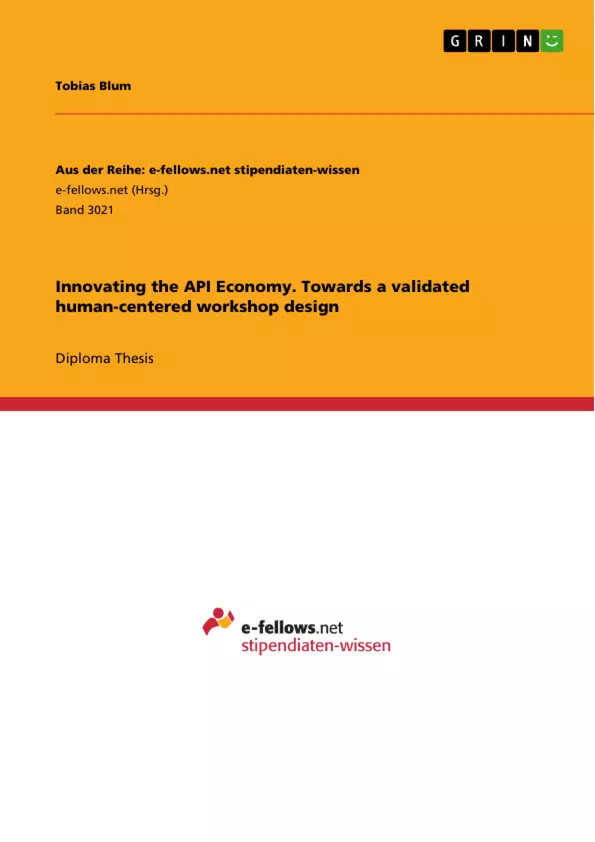
Innovating the API Economy. Towards a validated human-centered workshop design
Diplomarbeit, 2016
164 Seiten, Note: 5.25 (CHE-System)
Leseprobe
Inhaltsverzeichnis (Table of Contents)
- Introduction
- Relevance for research
- Research questions
- Research design & structure of thesis
- Research focus
- General Definitions
- Workshop
- API
- API Products
- API Economy
- Human-Centered Design
- Characteristics of APIs
- Technical Function
- Business Function
- Organizational Function
- Human-Centered Innovation
- Design Thinking
- HCD Swisscom
- Foresight Thinking
- Expert Interviews and research about the Workshop Design
- Framework for Interviews
- Interviews
- Results
- Expert Interview Findings
- Conclusions of expert interviews
- Draft
- Case Studies
- Workshop 1: Z-Squad
- Agenda
- Execution & Analysis
- Learnings
- Workshop 2: X-Squad
- Agenda
- Execution & Analysis
- Learnings
- Workshop 3: A-Squad
- Agenda
- Execution & Analysis
- Learnings
- Workshop 4 - Whole API Tribe
- General Factors
- Agenda & Participants
- Execution & Analysis
- Learnings
- Final design proposal & discussion of results
- Consideration of preconditions of workshop participants
- Final proposal for a workshop design
- Suitability of human-centered design methods for API workshops
- Success factors
Zielsetzung und Themenschwerpunkte (Objectives and Key Themes)
This master thesis investigates the development of a human-centered workshop design for identifying use cases for companies in the API economy. The research aims to establish a validated workshop structure through qualitative exploration, expert interviews, and case studies. The findings are then integrated into a comprehensive workshop proposal, providing a practical guideline for facilitating human-centered API workshops.
- Developing a human-centered workshop design for finding use cases in the API economy
- Validating the workshop design through expert interviews and case studies
- Analyzing the effectiveness of human-centered design methods for API workshops
- Identifying key success factors for implementing human-centered API workshops
- Creating a comprehensive workshop proposal for practical application
Zusammenfassung der Kapitel (Chapter Summaries)
The thesis begins by introducing the relevance of the research and defining key terms such as workshops, APIs, and the API economy. The author explores the characteristics of APIs, highlighting their technical, business, and organizational functions. Chapter 4 delves into human-centered innovation methodologies, specifically focusing on design thinking and foresight thinking. The research methodology is outlined in Chapter 5, which includes a framework for conducting expert interviews and analyzing the results.
The heart of the thesis lies in the case studies presented in Chapter 6. These case studies detail the implementation and analysis of four workshops, highlighting the challenges and opportunities of applying the proposed workshop design. The final chapter explores the preconditions for successful workshop implementation and presents the author’s final proposal for a validated workshop design. The author concludes by discussing the suitability of human-centered design methods for API workshops and outlining key success factors for effective implementation.
Schlüsselwörter (Keywords)
The primary keywords and themes explored in this thesis include API economy, human-centered design, workshop design, use-case identification, expert interviews, case studies, and validated workshop proposal. The work focuses on understanding the practical application of human-centered design principles in the context of API-driven innovation, exploring methods for facilitating collaborative workshops and identifying successful strategies for leveraging APIs within organizations.
Frequently Asked Questions
What is a human-centered workshop design for APIs?
It is a workshop structure that focuses on human needs and stakeholder value rather than just technical specifications to identify viable use-cases in the API economy.
How can the technical term "API" be made approachable?
By using prototyping to visualize APIs in interfaces and focusing on the API consumer and end-user needs through an "inside out" approach.
What are the two main modules of the proposed workshop?
The first module connects company services with stakeholders; the second discovers specific requirements by discovering needs directly with potential clients.
What methods are used in these API workshops?
Key methods include stakeholder maps, brainstorming, adapted customer journeys (API Service Blueprint), and rapid prototyping.
How was this workshop design validated?
The author conducted interviews with 9 experts and tested the draft in four separate case studies within companies like Swisscom.
Details
- Titel
- Innovating the API Economy. Towards a validated human-centered workshop design
- Hochschule
- Universität St. Gallen (Business Information Systems)
- Note
- 5.25 (CHE-System)
- Autor
- Tobias Blum (Autor:in)
- Erscheinungsjahr
- 2016
- Seiten
- 164
- Katalognummer
- V459491
- ISBN (eBook)
- 9783668942141
- ISBN (Buch)
- 9783668942158
- Sprache
- Englisch
- Schlagworte
- Workshop Design Thinking API API Economy Workshop Design Human-centered Innovation Customer-centered B2B2C API Products API Design Use-Cases
- Produktsicherheit
- GRIN Publishing GmbH
- Preis (Ebook)
- US$ 42,99
- Preis (Book)
- US$ 56,99
- Arbeit zitieren
- Tobias Blum (Autor:in), 2016, Innovating the API Economy. Towards a validated human-centered workshop design, München, Page::Imprint:: GRINVerlagOHG, https://www.diplomarbeiten24.de/document/459491
- Autor werden
- Ihre Optionen
- Vertriebskanäle
- Premium Services
- Autorenprofil
- Textarten und Formate
- Services für Verlage, Hochschulen, Unternehmen

- © GRIN Publishing GmbH.
- Alle Inhalte urheberrechtlich geschützt. Kopieren und verbreiten untersagt.
- info@grin.com
- AGB
- Open Publishing
Der GRIN Verlag hat sich seit 1998 auf die Veröffentlichung akademischer eBooks und Bücher spezialisiert. Der GRIN Verlag steht damit als erstes Unternehmen für User Generated Quality Content. Die Verlagsseiten GRIN.com, Hausarbeiten.de und Diplomarbeiten24 bieten für Hochschullehrer, Absolventen und Studenten die ideale Plattform, wissenschaftliche Texte wie Hausarbeiten, Referate, Bachelorarbeiten, Masterarbeiten, Diplomarbeiten, Dissertationen und wissenschaftliche Aufsätze einem breiten Publikum zu präsentieren.
Kostenfreie Veröffentlichung: Hausarbeit, Bachelorarbeit, Diplomarbeit, Dissertation, Masterarbeit, Interpretation oder Referat jetzt veröffentlichen!
- GRIN Verlag GmbH
-
- Nymphenburger Str. 86
- 80636
- Munich, Deutschland
- +49 89-550559-0
- +49 89-550559-10
- info@grin.com
-









